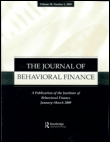
Journal of Behavioral Finance
Scope & Guideline
Bridging Psychology and Financial Markets
Introduction
Aims and Scopes
- Behavioral Biases and Investor Psychology:
The journal emphasizes the study of behavioral biases—such as overconfidence, loss aversion, and herding behavior—and their effects on investor decision-making and market outcomes. - Market Sentiment and Its Effects:
Research on market sentiment, including the impact of social media, news, and emotional responses on trading behavior and asset pricing, is a core focus area. - Quantitative and Experimental Methods:
The journal encourages the use of advanced quantitative methods and experimental approaches to analyze investor behavior and market phenomena. - Interdisciplinary Perspectives:
It promotes interdisciplinary research that draws from psychology, economics, finance, and sociology to provide holistic insights into behavioral finance. - Impact of External Factors:
Studies examining how external factors such as economic policy, media sentiment, and technological advancements influence investor behavior and market dynamics are a significant aspect of the journal.
Trending and Emerging
- Influence of Social Media and Digital Platforms:
Research focusing on the role of social media and digital platforms in shaping investor sentiment and behavior is rapidly gaining traction, reflecting the increasing importance of online interactions in financial markets. - Machine Learning and AI in Finance:
There is a growing interest in applying machine learning and artificial intelligence to analyze investor behavior and predict market trends, showcasing the integration of technology in behavioral finance research. - Emotional and Psychological Factors in Investment Decisions:
Studies exploring the emotional and psychological underpinnings of investment decisions, including the impact of anxiety, fear, and confidence, are emerging as a significant area of focus. - Behavioral Finance in Cryptocurrency Markets:
Research on investor behavior and sentiment within cryptocurrency markets is trending, as these markets present unique challenges and opportunities for behavioral finance analysis. - Environmental, Social, and Governance (ESG) Factors:
There is an increasing emphasis on how behavioral finance intersects with ESG considerations, particularly in understanding how investor sentiment influences sustainable investing.
Declining or Waning
- Traditional Financial Metrics:
There appears to be a declining focus on traditional financial metrics and models alone, as researchers increasingly prioritize behavioral aspects over conventional financial analysis. - Theoretical Frameworks Without Empirical Validation:
The journal has seen a decrease in purely theoretical papers that lack empirical backing, as there is a growing emphasis on research that includes robust empirical evidence to support claims. - Longitudinal Studies on Market Trends:
There is a noticeable reduction in longitudinal studies that track market trends over extended periods, possibly due to a shift towards more immediate and dynamic analyses. - Generalized Economic Models:
Research that applies generalized economic models without considering behavioral factors has become less common, indicating a pivot towards more nuanced, behaviorally-informed analyses.
Similar Journals
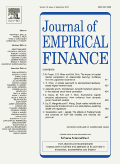
Journal of Empirical Finance
Connecting theory and practice in empirical finance.Journal of Empirical Finance, published by Elsevier, stands as a key resource in the areas of finance and economics, with a definitive focus on empirical studies. As a prominent journal since its inception in 1993, it has made significant strides in contributing to the academic community, evidenced by its soaring categorization in Q1 for Finance and Q2 for Economics and Econometrics as of 2023. With an ISSN of 0927-5398 and an E-ISSN of 1879-1727, the journal emphasizes robust, data-driven analysis to inform both theoretical and practical aspects of financial research. While access options do not include open access, the journal ensures that its content remains accessible to a diverse audience of researchers, professionals, and students. It fosters a platform for innovative research and discourse, significantly impacting the fields of finance, economics, and econometrics. The Scopus rankings further bolster its reputation, placing it in the 61st percentile in both categories, reflecting a commitment to high-quality research output. As the journal continues to evolve, it invites contributions that push the boundaries of empirical finance, enabling a deeper understanding of financial mechanisms that drive global economies.
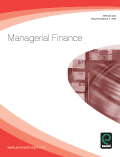
MANAGERIAL FINANCE
Shaping the Future of Managerial Finance.MANAGERIAL FINANCE is a prestigious academic journal published by Emerald Group Publishing Ltd, focused on the areas of finance, management, and strategy. With an ISSN of 0307-4358 and an E-ISSN of 1758-7743, this journal has carved a niche for itself within the business and financial sectors, achieving a commendable Q2 category ranking across multiple domains, including Business, Management and Accounting, Finance, and Strategy and Management, as of 2023. The journal aims to provide a platform for insightful research and critical analysis while fostering an understanding of contemporary financial practices and theories. With its wide-ranging scope, it serves as a vital resource for researchers, professionals, and students alike, looking to stay abreast of the latest trends and challenges in managerial finance. The editorial board is committed to maintaining academic rigor, ensuring that articles published are of the highest quality and relevance to the field. By bridging the gap between theory and practice, MANAGERIAL FINANCE is an essential reference for anyone involved in financial decision-making and strategic management.

Journal of Asset Management
Pioneering Research in Business and Asset StrategyThe Journal of Asset Management, published by Palgrave Macmillan Ltd, is a premier academic journal dedicated to advancing the fields of asset management, business strategy, and international management. With an ISSN of 1470-8272 and an E-ISSN of 1479-179X, this journal has established its reputation as a vital resource for researchers, professionals, and students alike. Operating from the United Kingdom, it spans a convergence of scholarly contributions from 2009 to 2024, positioning itself prominently in the academic landscape. In 2023, it achieved a remarkable Q2 ranking in three key categories: Business and International Management, Information Systems and Management, and Strategy and Management. The journal's Scopus ranks further reflect its impact, featuring positions within the top percentile for relevant academic disciplines, emphasizing its importance and influence. While it currently offers traditional subscription-based access, the journal remains committed to disseminating vital research that shapes best practices in asset management. Researchers are encouraged to engage with the cutting-edge findings published herein, making it an essential tool for anyone looking to deepen their understanding of asset management dynamics and strategic decision-making.
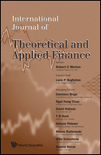
International Journal of Theoretical and Applied Finance
Empowering researchers with a platform for financial excellence.International Journal of Theoretical and Applied Finance is a distinguished publication in the field of finance, serving as a critical platform for the dissemination of innovative research and theoretical insights since its inception in 2003. Published by World Scientific Publishing Co Pte Ltd in Singapore, this journal boasts an impressive Q2 ranking in the realms of Economics, Econometrics, and Finance (miscellaneous) and a solid Q3 status in Finance for 2023. With a commitment to advancing knowledge in the complex world of theoretical frameworks and applied financial practices, it welcomes original research articles, comprehensive reviews, and case studies that explore varied facets of finance. Researchers, professionals, and students benefit from the journal's rigorous peer-review process and an ever-expanding repository of knowledge, making it an indispensable resource in the financial academic community. The journal does not currently offer open access, reflecting its selective approach to publishing high-quality content aimed at a specialized audience.
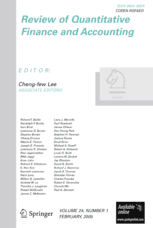
Review of Quantitative Finance and Accounting
Pioneering Quantitative Approaches for Tomorrow's ChallengesThe Review of Quantitative Finance and Accounting, published by Springer, is a distinguished academic journal that has been at the forefront of scholarly discourse since its inception in 1991. With an ISSN of 0924-865X and an E-ISSN of 1573-7179, this journal specializes in the interdisciplinary realms of accounting and finance, particularly emphasizing quantitative methodologies and their applications in real-world scenarios. With an impressive track record reflected in its 2023 rankings, it sits in the Q2 category across key fields such as Accounting, Business Management, and Finance, demonstrating its relevance and influence within these domains. Although it operates without an Open Access option, the journal's content remains vital for researchers, professionals, and students aiming to deepen their understanding of quantitative approaches in finance and accounting contexts. The Review of Quantitative Finance and Accounting stands as an essential resource for advancing knowledge and fostering innovation within these critical disciplines.
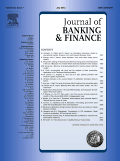
JOURNAL OF BANKING & FINANCE
Shaping Tomorrow's Banking Insights TodayWelcome to the Journal of Banking & Finance, a premier publication in the fields of finance and economics, expertly published by Elsevier. With its esteemed Q1 ranking in both the Economics and Econometrics and Finance categories for 2023, this journal frequently garners significant attention from researchers, professionals, and academics alike. Established in 1977, it has become a crucial resource for the latest research and advancements in banking and financial services, influencing policies and practices on a global scale. The journal's commitment to high-quality, peer-reviewed content ensures that it not only contributes to academic discourse but also drives real-world financial innovation. As part of the respected Elsevier publishing collection, the journal's rigorous standards and comprehensive analysis serve as indispensable tools for those seeking to understand and navigate the complexities of the financial landscape. Located in the Netherlands, the Journal of Banking & Finance continues to play a vital role in shaping the future of financial research through its impactful insights and research contributions.

Journal of Behavioral and Experimental Economics
Exploring the Nexus of Behavior and EconomicsWelcome to the Journal of Behavioral and Experimental Economics, a prominent publication founded by Elsevier Science Inc., dedicated to advancing research at the intersection of behavioral science and economics. With a focus on innovative methodologies and experimental frameworks, this journal addresses critical questions surrounding human decision-making, social interactions, and economic behaviors. It boasts a robust impact within its scope, achieving a Q2 ranking in both Applied Psychology and Economics and Econometrics, as well as a Q1 ranking in Social Sciences (miscellaneous) for the year 2023. The journal is accessible through various open access options, making cutting-edge research widely available to a global audience. With a commitment to publishing high-quality studies, the Journal of Behavioral and Experimental Economics serves as an essential resource for researchers, professionals, and students eager to explore the complexities of economic behavior in today’s society.
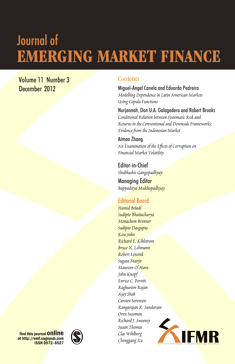
Journal of Emerging Market Finance
Catalyzing Research in Emerging Market FinanceThe Journal of Emerging Market Finance, published by SAGE Publications India Pvt Ltd, is a premier academic journal that serves as a vital resource for researchers, professionals, and students in the fields of finance and economics. Established in 2002, this journal focuses on the multifaceted dynamics of emerging market economies and their financial systems. With an ISSN of 0972-6527 and an E-ISSN of 0973-0710, it has garnered attention with its respectable Q3 rankings in both the Economics and Econometrics and Finance categories, reflecting its commitment to high-quality research. Despite its limited open-access options, the journal remains a significant platform for scholarly discussions, providing insights on emerging financial instruments, market behaviors, and economic policies in developing economies. As a continuously evolving publication, it aims to bridge the gap between theory and practice, promoting an understanding of the complexities faced in these vibrant markets, ultimately serving the academic community with relevant and impactful research until 2024 and beyond.

Annual Review of Financial Economics
Pioneering Comprehensive Reviews in Financial EconomicsAnnual Review of Financial Economics, published by Annual Reviews, stands as a pivotal journal in the fields of Economics and Finance, recognized for its rigorous analysis and comprehensive reviews since its inception in 2010. With an impressive impact factor reflected in its Q1 ranking in both Economics and Econometrics and Finance for 2023, this journal serves as an essential resource for researchers, professionals, and students keen on understanding the dynamic interplay of financial theories and practices. The ISSN 1941-1367 and E-ISSN 1941-1375 signal its commitment to accessibility and dissemination of cutting-edge research within the community. Addressing crucial topics from market behavior to economic modeling, each annual volume synthesizes the latest findings and theoretical advancements, thus contributing significantly to the global discourse within financial economics. With its high Scopus rankings, including a finance rank of #75 out of 317, the journal continues to foster a deep understanding of financial systems and their implications, serving as an invaluable tool for anyone engaged in the broader economic landscape.

Critical Finance Review
Transforming finance through critical analysis and innovative thought.Critical Finance Review is a premier academic journal dedicated to advancing the field of finance through the publication of high-quality research that spans various dimensions of the discipline. Published by NOW PUBLISHERS INC, this journal has quickly established itself as a leading source of innovative finance scholarship, achieving a notable Q1 classification in the 2023 finance category. Operating under a rigorous peer-review process, the journal ensures the academic integrity and relevance of its content, which attracts contributions from both emerging and established scholars. With an ISSN of 2164-5744 and E-ISSN 2164-5760, it is accessible to a global audience, though it operates under traditional access models. The journal welcomes a diverse range of topics including, but not limited to, risk management, financial markets, and quantitative finance, making it an essential resource for researchers, professionals, and students who are keen to explore the complexities of financial systems and develop new insights in the ever-evolving landscape of finance. Based in the United States, Critical Finance Review holds a significant position within the academic community, fostering a collaborative environment that encourages innovative thinking and practical applications of financial theories.